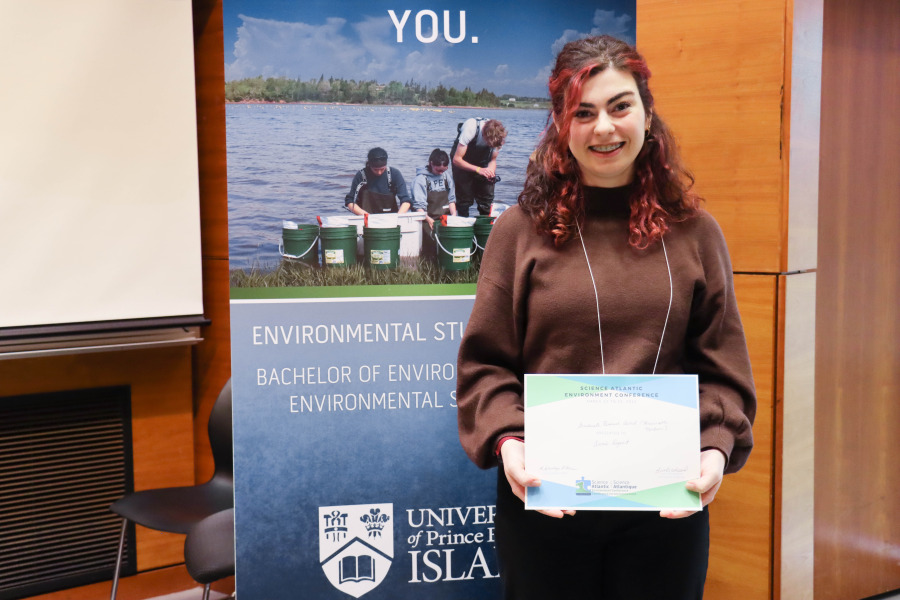Science Atlantic Environment conference at UPEI a success

University students from across Atlantic Canada learned about environmental research taking place in the region during the 2024 Science Atlantic Environment conference hosted by UPEI’s Environmental Studies program last month.
Seventy-eight students and faculty from universities in Atlantic Canada attended the conference. Forty-nine oral and poster presentations were given by undergraduate and graduate students, 11 of whom were from UPEI.
Annie Dysart, a UPEI MSc in Environmental Sciences student supervised by Dr. Mike Van den Heuvel, won honourable mention in the graduate research award category for her presentation titled “Using eDNA to assess fish populations in aquatic environments of Prince Edward Island, Canada.”
Dysart said that the conference was a great opportunity to connect with students from other schools in the region who are all studying interesting topics in the environmental field.
“Whether or not certain talks were directly related to my project, I really enjoyed hearing about the wide range of environmental research work going on in the Maritimes,” she said. “I also got to better connect with UPEI students and faculty since environmental science can encompass several programs including biology, climate change and adaptation, environmental studies, and certain island studies research projects, so that we don’t necessarily cross paths on campus often. The conference gave me a chance to talk about my research in a formal setting and answer thought-provoking questions—an experience I can build on to prepare for my master’s defence, which I hope to have completed over the next school year.”
Fourth-year environmental studies student Laura Apblett, a volunteer on the organizing committee, was excited to participate in the conference. She introduced one of the two keynote speakers and led a field trip to the Canadian Centre for Climate Change and Adaptation in St. Peter’s Bay.
“During the conference, I met other student researchers in the region and presented my honours research in soil science and nutrient management,” she said. “It was a lot of fun to spend time with students from the other schools and to hear about their research. I learned about a diverse range of topics, from scientific communication in Mi'kmaq to using fungi as bioremediation tools. I am grateful for having had the opportunity to participate in one of these conferences before my career as an undergraduate student ends this year.”
Research presented at the conference covered a wide range of topics, including tree species’ growth sensitivity to seasonal temperatures; the impact of white-nose syndrome on northern long-eared bats and the little brown bat in North America; scientific communication in a vulnerable language; community-based renewable energy on PEI; bobolink (Dolichonyx oryzovorous) breeding and habitat in the Wolastoq/Saint John River Valley; and the impact of drought on the urban environment.
The participants heard from two keynote speakers: Dr. Judith Nyiraneza, research scientist with Agriculture and Agri-Food Canada, who presented on “Soil-regenerative management practices to enhance PEI soil health,” and Dr. Joshua MacFadyen, UPEI Canada Research Chair in Geospatial Humanities, who gave a presentation called “Mapping Eastern Canadian Energy Transitions in City, Field, and Forest.”
“The conference was a great learning experience for the students,” said Dr. Carolyn Peach Brown, professor and director of environmental studies at UPEI and chair of the organizing committee. “This was the first time that UPEI had hosted the conference, and it was a resounding success.”